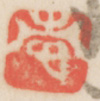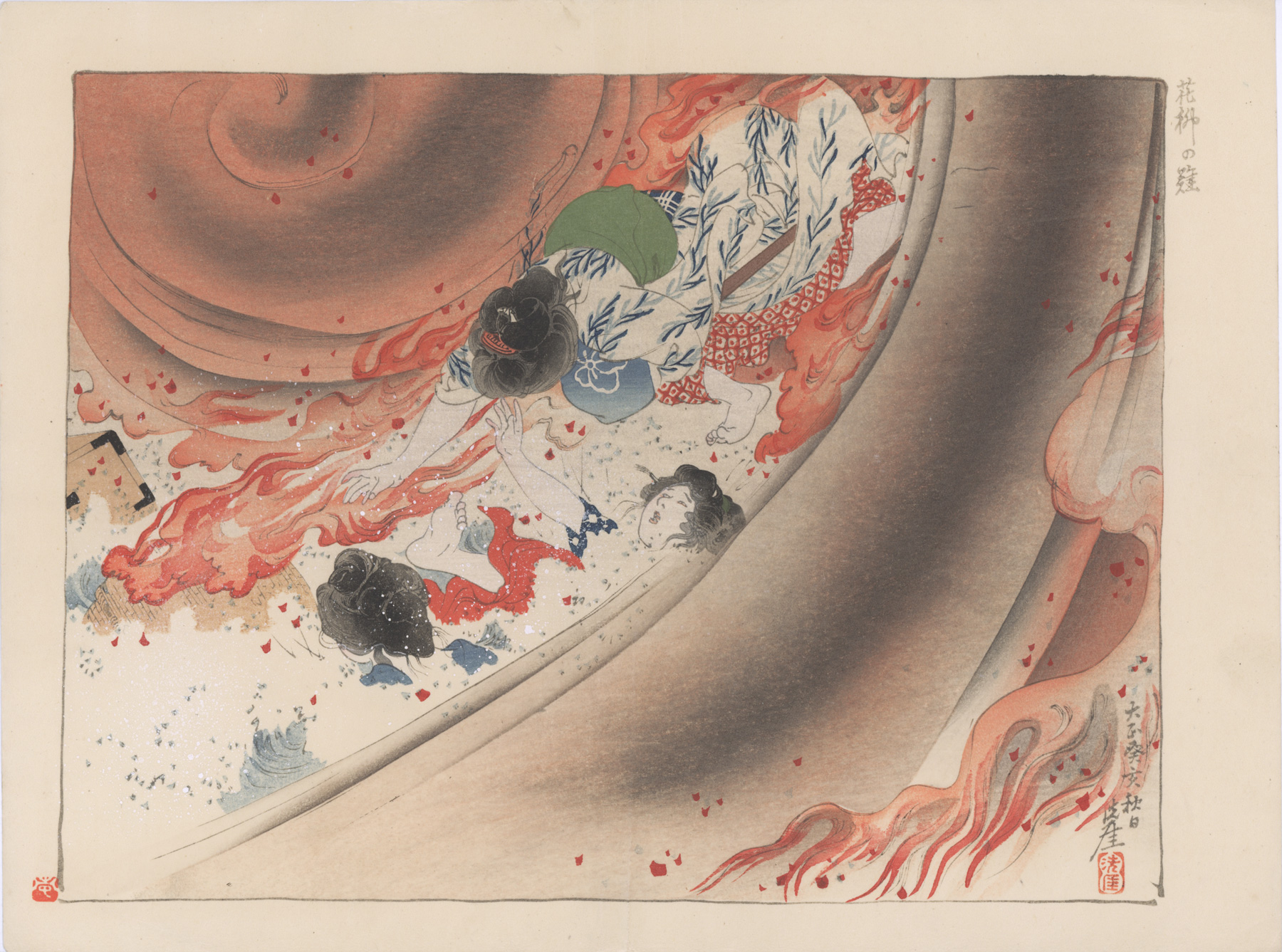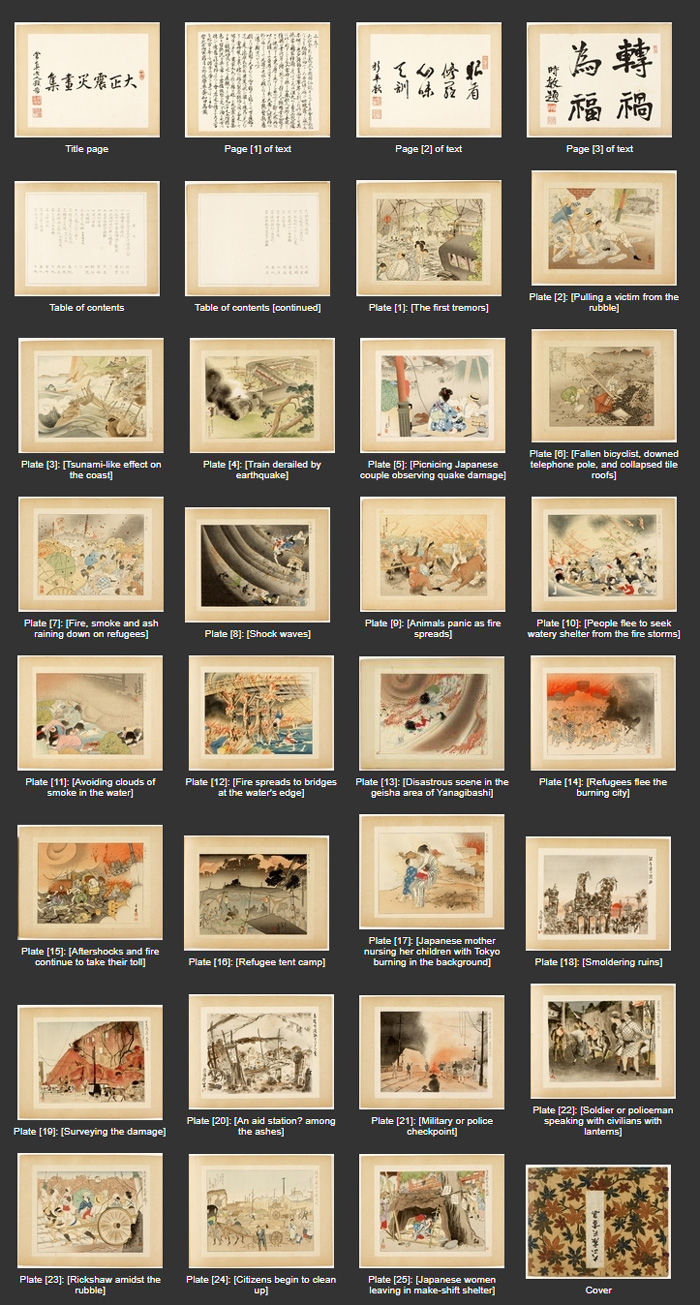About This Print
One of three prints (also see IHL Cat. #1406) contributed by the artist Igawa Sengai (1876-1961) to the series Pictures of Taishō Earthquake, issued in 1926 three years after the 1923 Great Kantō Earthquake. This print pictures one of the horrific firestorms (fire tornadoes) that came in the aftermath of the earthquake. Sengai portrays three geisha being swept in the spinning fire tornado in the Yanagibashi district. The worst of the firestorms immolated "44,000 people who had sought refuge near Tokyo’s Sumida River in the first few hours, only to be immolated by a freak pillar of fire known as a 'dragon twist.'”1About the Series "Pictures of the Taishō Earthquake"
This series consists of 25 prints by nine, mostly lesser-known, artists, a number of whom, including this print's creator, were students of the Nihonga artist Tomioka Eisen (1864-1905). The nine artists are Shunhan Katayama (fl. c. 1901–1926); Yawata (Yahata?) Hakuhan (1893–1957); Nobuchi Kōgai (fl. c. 1920s); Igawa Sengai (1876-1961); Kirigaya (Kiriya) Senrin (1877–1932); Shibata Kōyō (fl c. 1920s); Hamada Josen (1875-?); Kondō Shiun (fl. c. 1923– 1930s) and Takashima Unpō (1894-1987).
When this series was issued in 1926, Tokyo and its environs were already well-along in their rebuilding, which "started before the last embers were out"1 and was to be officially completed in 1930. This series, along with an earlier 1924 series of 36 prints, Collection of Woodblock Prints of the Taishō Earthquake, served to, in the words of the pre-publication announcement for the 1924 series, convey "to future generations, in an artistic manner, the true import of these events."2
All of the prints in this series and the bound book in which they were issued (see below), can be viewed on the website of Wolfsonian Florida International University's Digital Image Catalog where they formed part of their September 2011 commemorative exhibition of the tragedy of September 11, 2001, titled “Reflections on Loss and Commemoration.”
Digital Image Catalog and see details of each thumbnail.
The Great Kantō Earthquake
Source: The Artist's Touch, The Craftsman's Hand: Three Centuries of Japanese Prints from the Portland Art Museum, Maribeth Graybill, Portland Art Museum, Oregon, 2011, p. 273.
"The Great Kantō Earthquke of 1923 stands in memory as one of the most terrifying calamities in Japanese history. Registering at a magnitude of 7.9, the quake struck on September 1, with its epicenter some 50 miles southwest of Tokyo, in Sagami Bay. The hour was 11:58A.M., just when households everywhere were lighting small charcoal stoves to prepare lunch. Fires broke out instantly in the densely populated cities of Tokyo and Yokohama and were spread by high winds. Since the earthquake had broken the water lines, both cities were reduced to smoldering ruins within a few hours.... The earthquake and its aftermath caused well over 140,000 deaths and left nearly 700,000 people homeless."
Print Details
| IHL Catalog | #1406 |
| Title | Disastrous Scene in the Geisha Area of Yanagibashi Karyū no nan 花柳の難 Karyū disastor [as written in the print's upper right margin; English translation is uncertain] Disastrous Scene in the Geisha Area of Yanagibashi 花柳街の惨状 柳橋所見 (Karyūkai no sanjō Yanagibashi shoken) as written in table of contents for series |
| Series | Pictures of the Taisho Earthquake (Taishō shinsai gashū 大正震災画集) (also seen translated as Taishō Earthquake Disaster Print Collection) |
| Artist | Igawa Sengai (1876-1961) |
| Signature |  洗厓 Sengai |
| Seal | 洗厓 Sengai (see above) |
| Publication Date | 1926 |
| Publisher | Emaki Kenkyūkai 絵巻研究会 [エマキ ケンキュウカイ] |
| Impression | good |
| Colors | good |
| Condition | good - overall toning; vertical centerfold; staining in right margin; wrinkling |
| Genre | |
| Miscellaneous |  unread seal in lower left corner in margin. unread seal in lower left corner in margin. |
| Format | |
| H x W Paper | 8 5/8 x 11 3/8 in. (21.9 x 28.9 cm) |
| H x W Image | 7 3/8 x 9 3/4 in. (18.7 x 24.8 cm) |
| Collections This Print | The Wolfsonian FIU Library Collection (JAPA) 83.2.2324; Mills College Art Museum |
| Reference Literature | Imaging Disaster: Tokyo and the Visual Culture of Japan's Great Earthquake of 1923, Gennifer Weisenfeld, University of California Press, 2012, p. 94, fig. 3.9. |



